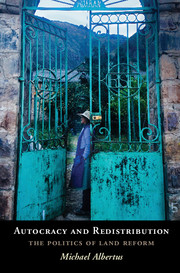
- Publisher:
- Cambridge University Press
- Online publication date:
- October 2015
- Print publication year:
- 2015
- Online ISBN:
- 9781316227107


When and why do countries redistribute land to the landless? What political purposes does land reform serve, and what place does it have in today's world? A long-standing literature dating back to Aristotle and echoed in important recent works holds that redistribution should be both higher and more targeted at the poor under democracy. Yet comprehensive historical data to test this claim has been lacking. This book shows that land redistribution - the most consequential form of redistribution in the developing world - occurs more often under dictatorship than democracy. It offers a novel theory of land reform and develops a typology of land reform policies. Albertus leverages original data spanning the world and dating back to 1900 to extensively test the theory using statistical analysis and case studies of key countries such as Egypt, Peru, Venezuela, and Zimbabwe. These findings call for rethinking much of the common wisdom about redistribution and regimes.
Co-Winner, 2017 Bryce Wood Book Award, Latin American Studies Association
Co-Winner, 2016 Gregory Luebbert Book Award, Comparative Politics Section, American Political Science Association
'This book is an exceptional achievement. It combines theoretical and methodological sophistication with empirical richness. Albertus demonstrates that land redistribution is more likely under dictatorship than democracy and builds a persuasive argument about why that is the case. The book is an outstanding contribution to the literatures on land redistribution, democracies and dictatorships, political economy, and Latin American politics.'
Scott Mainwaring - Eugene and Helen Conley Professor of Political Science, University of Notre Dame
'Albertus’ book is a must-read for understanding distributive politics in Latin America and beyond. Albertus provides a crucial contribution to the discipline by focusing on the political incentives leading to redistribution under different types of political regime. Based on an impressive study of land reforms, he provides a novel theory for understanding land redistribution and the different conditions that led to land renegotiation and colonization. This shift to the incentives of elites and their institutional possibilities provides a crucial contribution to the literature on democracy and redistribution. He finds support for his theory using an impressive dataset of cross-national evidence combined with in-depth longitudinal analyses of Peru and Venezuela. Without doubt, this book will become a reference in comparative studies of development and distributive politics more generally.'
M. Victoria Murillo - Columbia University
'In this important book Albertus provides new answers to a range of questions about land reform. When does meaningful land reform take place? Why are some reform programs more efficient than others? Albertus’ answers - for example, that land reform is more likely under authoritarian regimes than under democratic ones - challenge the conventional wisdom. This book will be of interest to comparative scholars as well students of economic development.'
Barry R. Weingast - Ward C. Krebs Family Professor, Stanford University
'A great paradox of modern political life is that concentrated landed wealth is a great frozen ice cap blocking the emergence of modern democracy and development. Yet, democracies themselves seem less capable of implementing land reform than autocracies. To date we have only the barest understanding of the complex politics of land reform. In this careful and ambitious study, Michael Albertus untangles these puzzles, constructing the most comprehensive cross-national and historical dataset on land reform alongside carefully crafted case studies of Peru and Venezuela. The result is an argument that provides the most compelling political theory of land reform to date that has broad implications for the study of democracy, redistribution and autocracy.'
Daniel Ziblatt - Harvard University, Massachusetts
 Loading metrics...
Loading metrics...
* Views captured on Cambridge Core between #date#. This data will be updated every 24 hours.
Usage data cannot currently be displayed.